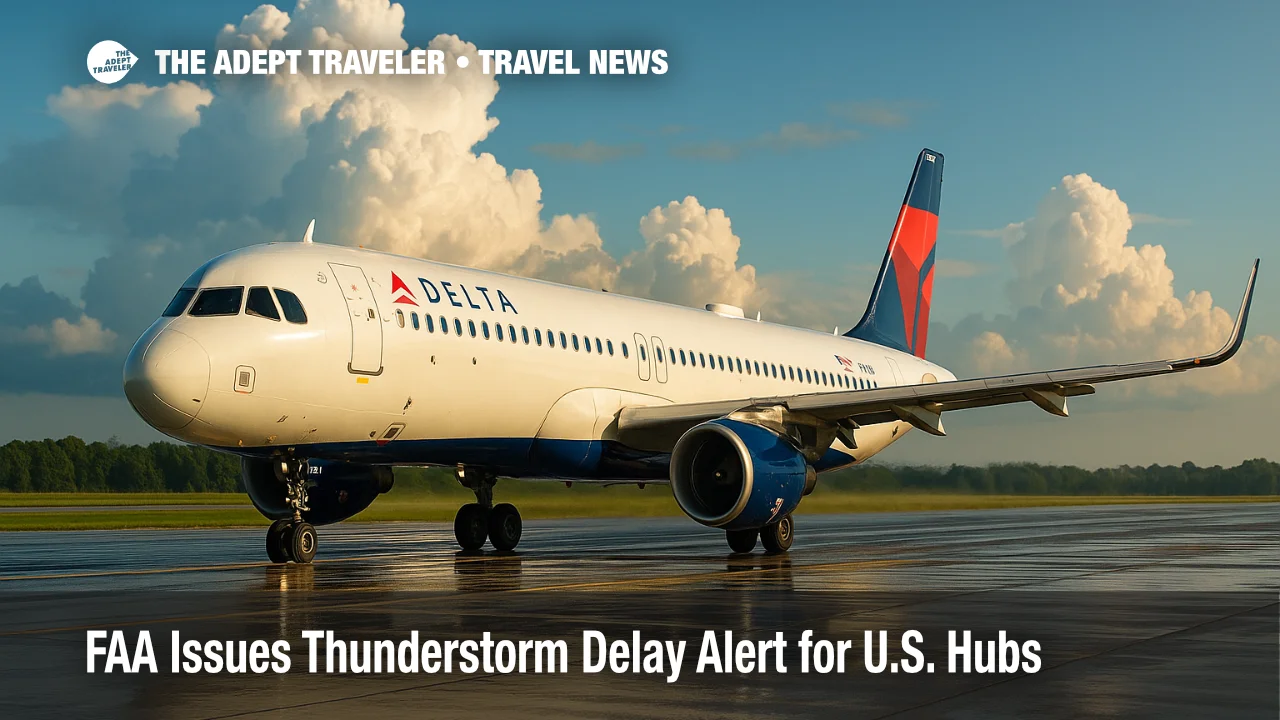FAA Daily Air Traffic Report, July 30, 2025: Thunderstorm-Related Flight Delays

Atlanta, Charlotte, Chicago, Denver, five Florida gateways, and San Francisco are bracing for weather-driven slow-downs today, according to the FAA's morning traffic outlook and Command Center operations plan. All ten airports are currently posting minimal gate-hold times-15 minutes or less-but the agency warns thunderstorms could trigger afternoon ground-stops that stretch waits toward 45 to 90 minutes. Below is what travelers should know, plus a refresher on invoking "Rule 240" to secure a quicker ride when schedules unravel.
Key Points
- Why it matters: Rolling storms can snowball into nationwide delays within hours.
- Current gate-hold averages: 0-15 min at all listed hubs.
- FAA projects ground-stops after 3 p.m. ET at ORD/MDW; 6 p.m. at ATL, CLT, and Florida hubs.
- Low marine layer at SFO may prompt a short ground-delay program.
- Travelers can still request Rule 240 rebooking on another airline at no extra cost when delays are "controllable."
Snapshot
This morning's FAA Daily Air Traffic Report flags a classic summer weather pattern: slow-moving storm cells drape the Southeast and Midwest, while a coastal stratus deck clings to San Francisco. Although real-time status boards show each hub operating with only "minor" taxi and airborne holding-15 minutes or less-the Air Traffic Control System Command Center expects two later storm waves. Chicago's second line of storms, forecast between noon and 5 p.m. CT, is most disruptive; Atlanta and Florida airports enter the threat window around sunset. Travelers departing after 2 p.m. local should pad connections or choose flexible-fare options that waive change fees.
Background
Thunderstorm season is peak stress for the National Airspace System. Convective weather forces traffic managers to shrink arrival flows for safety, cascading into gate holds nationwide. Ground-delay programs (GDPs) meter flights before push-back, adding predictable but often lengthy waits. When cells intensify directly over an airport, controllers escalate to a ground stop, halting inbound traffic entirely. The FAA's Operations Plan Advisory 032 spells out that scenario today for ORD/MDW, with "probable" GDPs and a "possible" ground stop after 3 p.m. CT. Similar caution notes target ATL, CLT, MCO, TPA, MIA, FLL, and PBI after 6 p.m. ET, and DEN's overnight storms may linger into early morning operations.
Latest Developments
Chicago prepares for two storm rounds
The Command Center anticipates a first squall line over eastern Iowa by midday, followed by a stronger system this afternoon. If visibility and ceiling minima drop, inbound flights face holds of 45-90 minutes and potential reroutes through Milwaukee or St. Louis airspace.
Southeast primed for evening convection
Moist Gulf flow and daytime heating will likely blossom storms over Georgia and the Carolinas near rush-hour. Gate holds at ATL and CLT could climb from today's ≤15 minutes to 45 minutes, with ripple effects on Delta and American banks.
Florida hubs on thunder-watch
Orlando, Tampa, Miami, Fort Lauderdale, and Palm Beach remain clear this morning, yet the FAA labels 6-10 p.m. ET as "GDP possible." Travelers on tight cruise-port connections should monitor push-back times closely.
Analysis
While current hold-time averages are minor, the Operations Plan's probabilistic language-"ground stop/delay program probable"-signals a high risk that metrics will shift abruptly. When airspace throughput drops, airlines typically opt for gate holds to dodge costly fuel burn in airborne stacks. For passengers, gate holds under 30 minutes rarely jeopardize connections, but once GDP compression exceeds 45 minutes, missed connections surge, forcing mass rebooking. Key mitigating moves: book longer layovers, use airline apps for rolling re-accommodation, and know each carrier's contract-of-carriage commitments. The Department of Transportation's Customer Service Dashboard shows Alaska, American, Delta, JetBlue, and United explicitly promise free rebooking on another airline during "controllable" delays-a modern echo of the old Rule 240. Low-cost carriers generally do not. Armed with this data, travelers can press agents (politely) for an interline endorsement when a long-haul misconnect looms. Documenting wait times and delay codes strengthens any subsequent refund claim.
Final Thoughts
Morning calm can be deceptive on heavy-weather days. With thunderstorms stalking five major regions, today's hold times could jump quickly from a tolerable 15 minutes to an hour or more. Staying proactive-tracking alerts, screenshotting delay notices, and invoking Rule 240 rights-keeps travel plans on course when summer skies turn turbulent. Travelers who plan, ask, and document still stand the best chance of beating thunderstorm delays.
